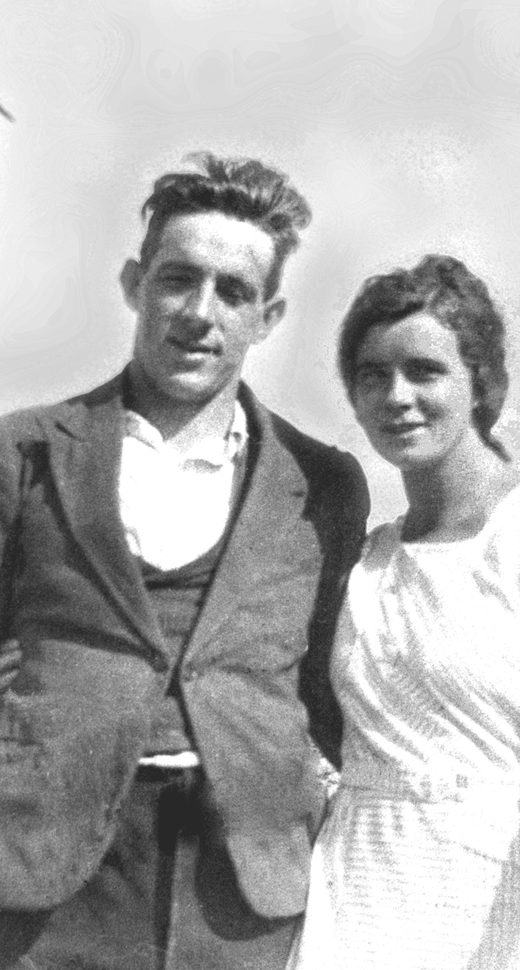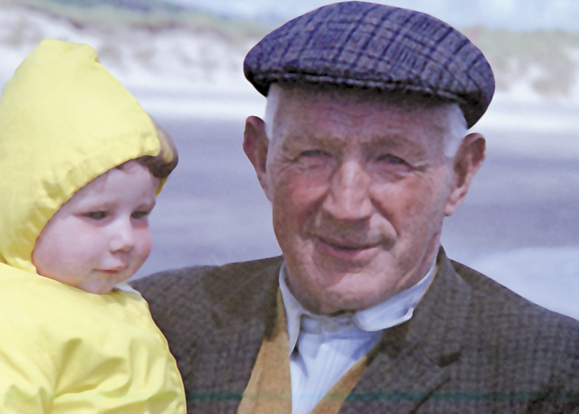Christopher Connell writes on his Uncle Jimmy McSweeney, the very model of the Irish bachelor farmer.
℘℘℘
My uncle Jimmy McSweeney was laid to rest recently beside his mother and sister in the yard of Saint Patrick’s Church in Dunmanway. The last of his generation, he was the very model of the Irish bachelor farmer, yet he left a family that extends across Ireland, across the seas, and across generations. He was deeply loved by many for his kindness and sweetness, for his laughter and wit, for the delight he took in slamming down a winning trick at cards, and for his insufferable stubbornness (for he was, of course, a McSweeney).
He loved children most of all: pure, unsullied, innocent, not yet cowed or tamed by their parents or the working world or whatever it is that separates us from our youth. Jimmy wasn’t just in touch with his inner child. He was that child, and it gave him the strength to stand up to his more worldly siblings when they ventured back to Inchincurka with advice on how to run the farm. It was a farm and a family held together at first by the will and determination of our formidable grandmother, widowed and left with a half-dozen children, then struck again a decade later by the loss of Con, the one born farmer in the bunch. So while his brothers and sisters headed off to college or America, Jimmy reluctantly accepted the fate that left him on the farm, milking the cows and tilling those damp, rugged 57 acres. The cows were the bane of his existence, tying him closer to the land than he wished to be and limiting his adventures to places that could be reached in the Morris Minor between the morning milking and the late afternoon, when those infernal creatures would be moseying relentlessly back to the barn. His dog Shep shared his disdain for the cows.
I mentioned in an earlier Irish America story (“Never Mind the Weather,” February /March 2002) how my strong-willed cousin John McSweeney came to reverse-emigrate to Ireland at the age of eight in 1948. He was the Yank Who Came to Dinner, simply refusing to go home to the Bronx at summer’s end. He grew to manhood on the farm under the doting hands of Grandmother McSweeney and Uncle Jimmy. It was a blessing for both, giving a new purpose to their lives at Inchincurka. By the time John headed off to pursue a career in Dublin, more Yanks began arriving regularly at Jimmy’s door, almost every summer from the mid-’60s into the ’80s.
Jimmy loved us all, but he especially loved the women his brothers brought into his life, first when Patsy married Hannie, and then when schoolmaster Sean abandoned the sporting life and wed Joan. Later it brought Jimmy a special joy to see the brides that his nephews brought back to the farm – Patricia, Jane, Irene, and Nancy. He was fond, too, of my sister Alice’s husband, Fred, but he loved to have the women around. Indeed, despite the advances of age, he remembered Nancy by name when she last visited after an absence of 20 years. And, of course, he was delighted to see the next generation of McSweeney and Connell children.
There was nothing like a joint visit by Hannie and my mother Mary to brighten Jimmy’s life and sweep the cobwebs out of Inchincurka. Hannie in particular relished spending vacations civilizing the old homestead. Jimmy timed his turns for the station with her visits. The cupboards would be brimming, the sideboard in the dining room would have bottles of Coke and even porter, and Hannie and Mary would have a pile of coal delivered so that Jimmy could burn something more than turf, branches, and wads of the Cork Examiner in the winter.

My mom brought Alice and me home with her in the summer of 1963. Jimmy let us drive the Morris Minor as well as his tractor, which I got stuck in mud on a joy ride down to the river. He extricated it without fuss and without raising an eyebrow. He was patient and kind, and always looked for and saw the humor in the human situation. He taught us to milk, too. I wasn’t too bad at that. But when he wanted my help up the fields on a special mission – castrating a bull calf – I guess he read my mind. The next thing I knew, that mission had been accomplished without me. As gentle as Jimmy was, he was a powerful man, and to this day I don’t know if he ever really needed my help, or just thought that was a part of education that I surely would miss in New York.
Perhaps he enlisted Jer Cotter, the great, great friend of his middle years, on that job. Some might consider Jimmy shy, at least until they recognized his puckish humor. But he was a raging extrovert next to Jer, who spoke with a Cork accent that a chainsaw couldn’t scratch. Jimmy sometimes had to translate Jer’s guttural jokes, although the laughter alone often was a sufficient substitute for the punch line. Jer did not own a car; he’d bike down from his small farm farther up those hills five miles north of Dunmanway. They dressed identically, from the caps to the dairy farmer’s uniform of dark tweed jacket and slacks almost leather from wear. They were a great pair, always off to Sunday Mass together and to the other social gatherings in the hills and hamlets of west Cork. They were teetotalers, but not puritans. They both enjoyed a game of card’s and the company of those who needed a glass of porter or a nip of poteen to unleash their inner self.
Nancy and I visited two or three times in the late ’70s, including on our honeymoon. The trips became less frequent as we began raising a family. That made our last visit home, over Christmas week and New Year’s in 1998-99, all the more special, because Matt and Ellen got to meet not only their Irish cousins but their Irish Uncles Jimmy and Sean. It was an odd time to visit, in the middle of winter, but as it turned out it was our final opportunity to see both these remarkable men. Son James missed that trip (he was off in college rowing), but he is currently pursuing dual Irish citizenship, a status that Matthew has already acquired, and which Ellen aspires to as well. Alice, Fred, and David also have gone this route. The Irish connection still flourishes despite the McSweeney diaspora.
Uncle Jimmy was and will forever remain Ireland to me – warm, funny, kind, with that twinkle in his eye, someone who knew that the only way to keep the world from breaking your heart was to find and cherish every opportunity to share laughter and a smile. He held a special place in his heart for his sister Mary, and now they are both gone, seven months apart, and both in their 95th year. It is such a remarkable span. The first Model T came off the assembly line in Detroit in 1908 the year of my mother’s birth. In 1909, the year Jimmy was born, they began pouring concrete for the Panama Canal, and Admiral Peary and Matthew Henson reached the North Pole – although it took five months for the world to learn of their feat. After Jimmy passed, we had an e-mail from my cousin Niall McSweeney in a few hours conveying the sad news. Jimmy was not yet seven during the Easter Rising, and still a lad during the dark days before independence when the Black and Tans patrolled those country lanes of west Cork.
Although Sean and Aunt Ciss were the credentialed teachers in the family, Jimmy, too, was a teacher. His life was a lesson for us all in how to live and how to be an example and source of strength for others. Jimmy kept the light burning for most of a century in Inchincurka. His longevity was an inspiration to people everywhere who are leery of doctors. My favorite Jimmy story is the one he told on himself about how he was finally convinced to see a doctor in Cork in the 1970s. The good doctor, in the process of pronouncing him fit, seized the opportunity to excavate the wax from Jimmy’s ears. Jimmy was taken aback when he stepped outside. “You never heard such a roar from the cars,” he exclaimed.
He was fortunate in having nephew John and wife Patricia look after him for many years, and then spend his final years in the care of the kind nuns and staff at the Mount Carmel Home in Clonakilty. That home was built as a workhouse after the Great Famine of the 1840s. The Sisters of Mercy later dedicated the home to Our Lady of Mount Carmel and opened the doors to elderly farmers and pensioners from throughout west Cork; they operate a modern hospital there as well. Jimmy was not immune from the clouds that obscured the minds and memories of his siblings as they advanced to great ages, but he remained more lucid and cheerful to the end. I suspect the staff at Mount Carmel can attest that whatever was done for Jimmy, he repaid many times over with friendship, warmth and kindness. May the Lord bless him and keep him in the palm of His hands. ♦


Leave a Reply